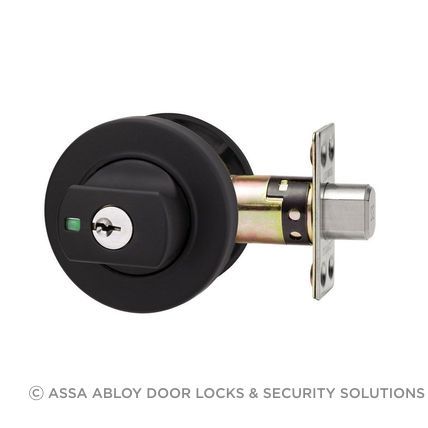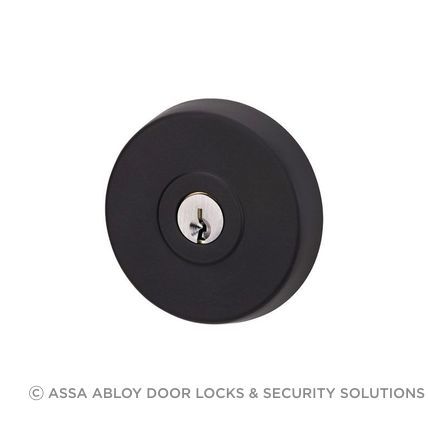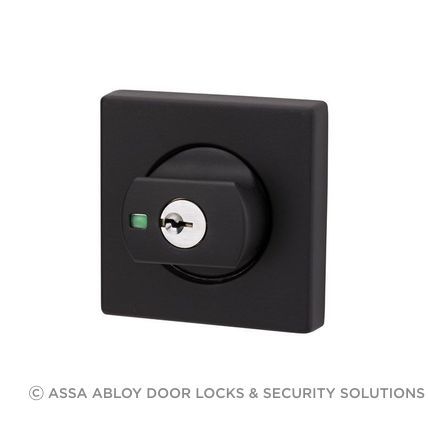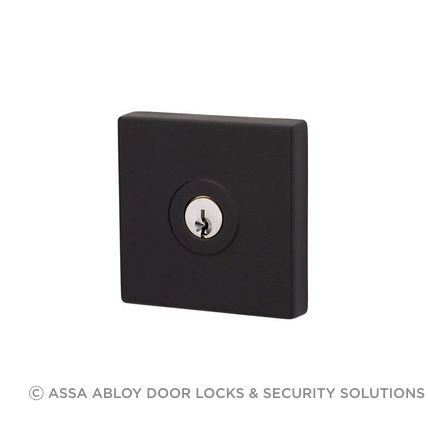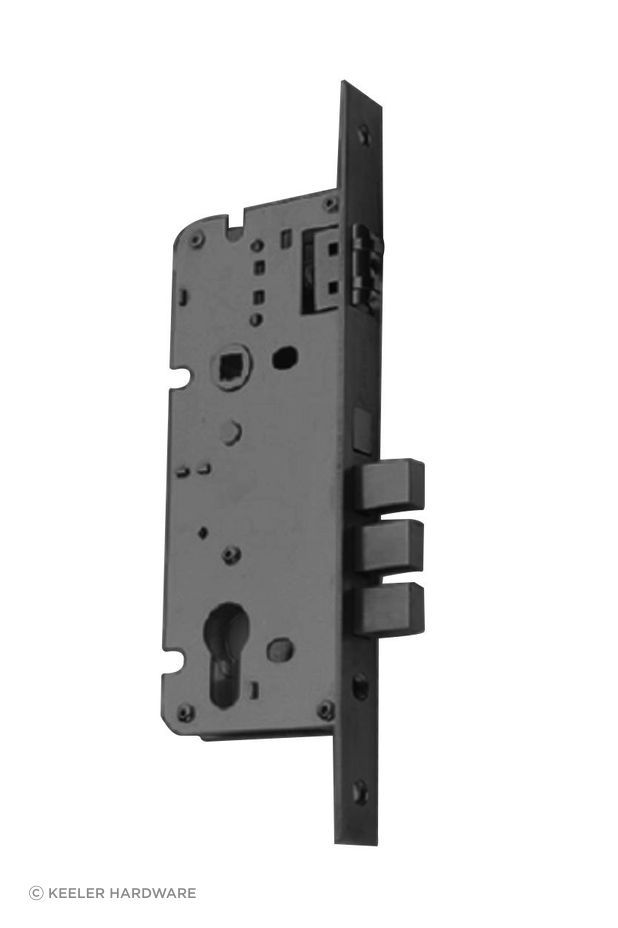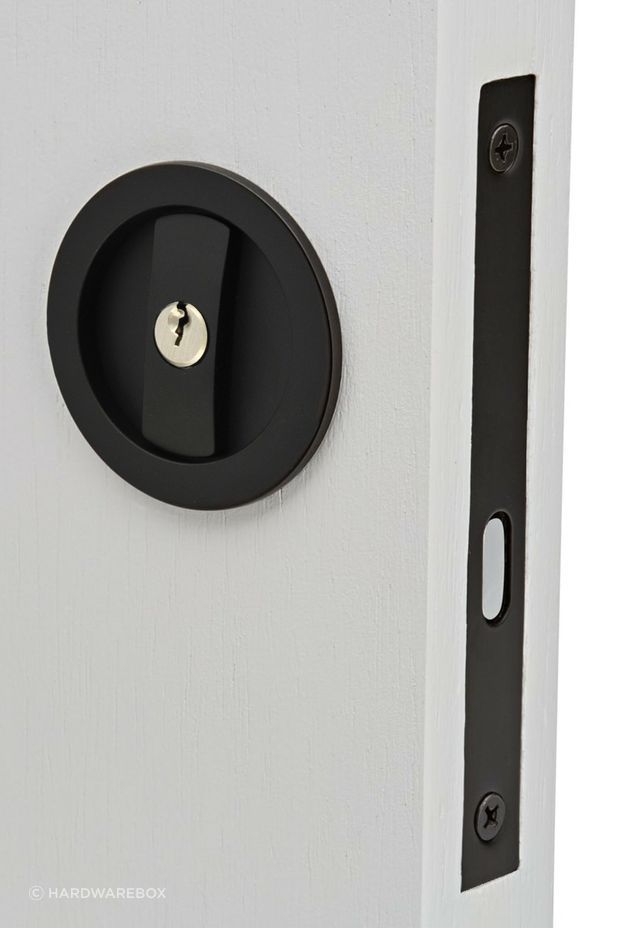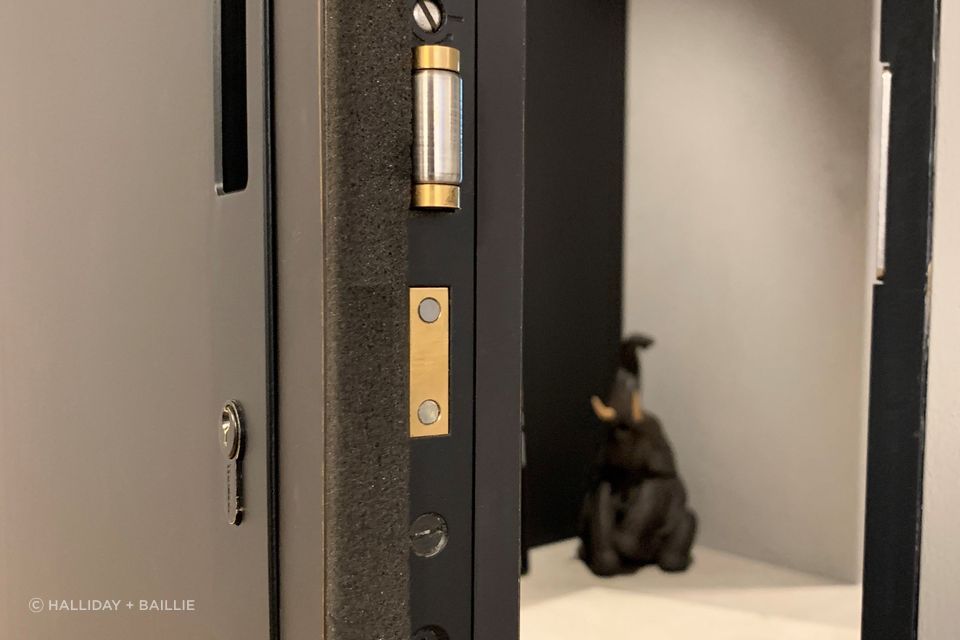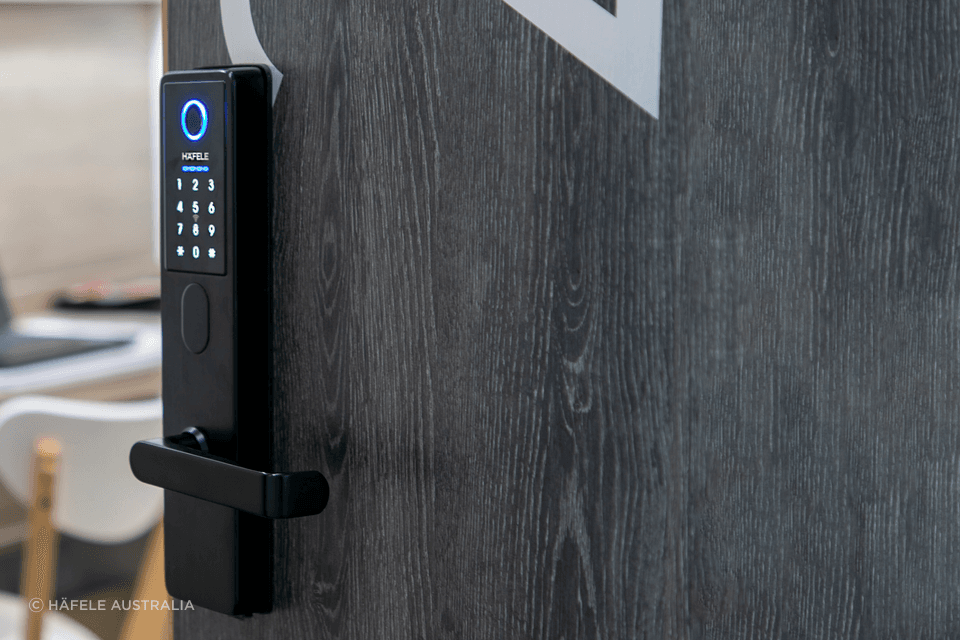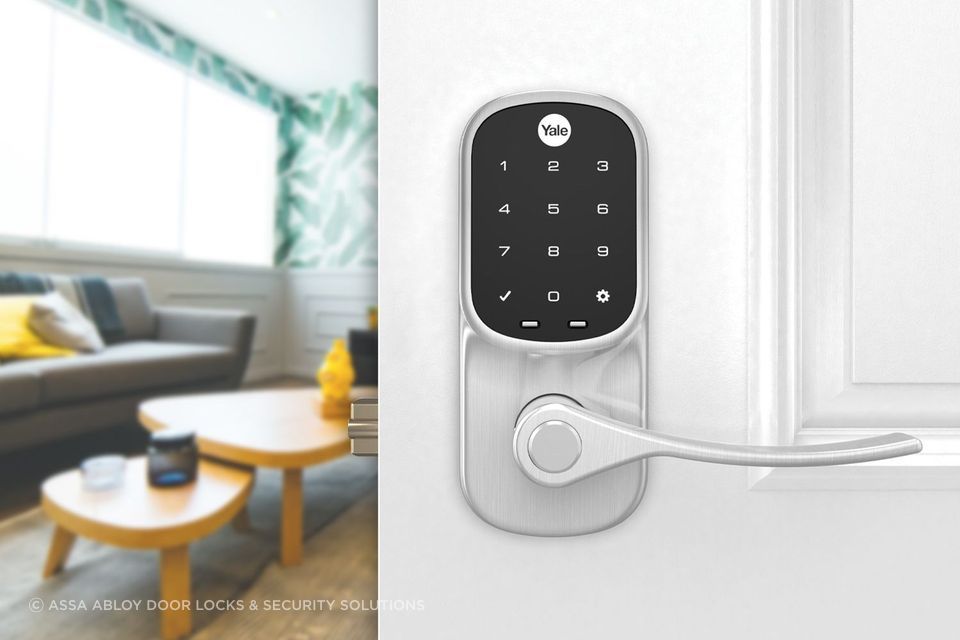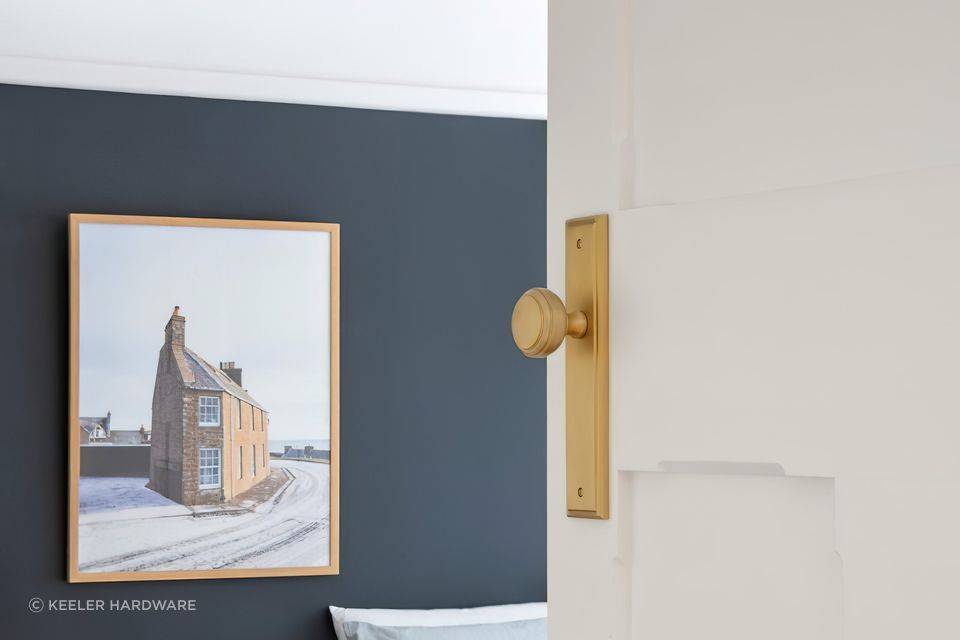6 types of door locks that will keep your home secure

2% (194,100) of households in Australia experienced a break-in in the twelve months preceding February 2023, according to the Australian Bureau of Statistics. These stats, on the surface, can make for alarming reading, but if you consider that the most common reason someone is able to unlawfully gain entry to a home is an unlocked door or window, then the picture appears slightly less severe.
Of course, the main takeaway is that you should keep your home locked and secure, and there’s no better way to do this than ensuring you have a secure door lock in place to keep intruders out of your home. To give you some understanding of what door locks can help you achieve this, we’ve taken a look at some of the different types and some of the scenarios they are best suited for.
1. Deadbolt Door Locks
The most secure type of door lock for homes is typically a deadbolt door lock. The ‘deadbolt’ refers to the locking mechanism, which uses a bolt that extends or ‘deadlocks’ into the door frame. This means that the bolt, once extended, stays in place, providing a strong resistance against lock picking and forced entry, unlike spring bolts found in common latch based locks.
Deadbolt locks are often considered the most secure due to the materials used, their design, and their resistance to tampering. First, looking at materials, most deadbolt door locks are constructed from robust metals such as solid steel or brass, which contributes to the lock's resistance to physical attacks such as kicking, prying, or using tools to try to force the lock.
In terms of design, deadbolts come in various styles with different security profiles and capabilities. For instance, single-cylinder deadbolts are a standard option. These locks require a key for operation from the outside, but inside, they feature a thumb turn (a small knob) for easy locking and unlocking. While convenient, this design can be a security risk if the door is near a window, as an intruder could break the window and turn the thumb latch to unlock the door.
A more secure type of deadbolt lock is the double-cylinder deadbolt. These locks are more robust and offer greater security. They require a key for operation from both the outside and inside, eliminating the thumb-turn mechanism. This design is particularly effective in deterring break-ins where an intruder might try to access the lock by breaking a window or glass panel close to the door. The requirement for a key on both sides makes it considerably more difficult for someone to unlock the door from the inside without a key.
Additionally, the design of deadbolts often includes features like hardened steel pins or anti-drill plates, which make them resistant to drilling or picking. Some models also incorporate advanced security features like smart key technology, allowing homeowners to rekey their locks quickly without a locksmith.
Where are Deadbolt locks suited to?
Deadbolt locks can be used for any door in your home that needs to be kept secure. However, they are particularly well suited for front doors, particularly if you live in a busy neighbourhood, and for a garage or shed where you store valuables that you need to keep safe.
How much does a Deadbolt lock cost?
Prices for deadbolt locks vary, but you can expect to pay anywhere from $20 to as high as $300+. The price difference often comes down to the quality of the deadbolt and the model. For example, a basic standard single-cylinder deadbolt will be at the lower end of the pricing, whereas a deadbolt is integrated with another type of lock, such as a smart lock, will be at the higher end.
Related article: Standard Door Sizes in Australia: A Complete Breakdown
2. Mortise Door Locks
Mortise locks are highly regarded for their robustness and integrated design. The term 'mortise' refers to the lock's installation process, which is embedded within the door, creating a more secure and reinforced lock system.
The construction of mortise locks, like deadbolt locks, involves heavy-duty materials like steel or brass. The design of a mortise lock includes a lock body housed in a mortise cut inside the door, a feature that inherently enhances the door’s structural integrity and security. In terms of mechanism, mortise locks usually combine a deadbolt and latch system. This dual mechanism increases security and provides versatility in locking options. For instance, when the door is closed, the latch keeps it shut, and engaging the deadbolt offers an additional layer of security.
Mortise locks are available in various configurations, catering to different security needs and door types. Some come with advanced features like anti-pick and anti-drill components, further fortifying them against lock tampering techniques. Their installation, however, is more complex than other lock types and requires professional fitting. This complexity is due to the need for precise cutting and alignment in the door, ensuring the lock's proper function.
Where are Mortise locks suited to?
Mortise locks are well-suited for main entrances and apartments because their deep embedding into the door frame significantly strengthens the door against forced entry. They're also well suited to internal areas where keeping the door locked is imperative, such as a bathroom.
How much does a Mortise lock cost?
Mortise locks range from around $75 to $500+ depending on the model. When you purchase a mortise lock, you're often purchasing the entire locking system, including the lock body, the lock trim (which may include handles, levers, or knobs), a strike plate, and a keyed cylinder, hence the higher initial price point.
3. Euro Cylinder Door Locks
Euro cylinder locks are popular due to their compatibility with a broad range of door styles, from contemporary UPVC to traditional wooden doors, including those equipped with multi-point locking systems. Central to these locks is the Euro-profile cylinder, a component that controls the mechanism of the lock's bolt. Unlike traditional locks, where the locking mechanism is integrated into the door hardware, the Euro cylinder lock's mechanism is contained within the cylinder itself, making it interchangeable and adaptable.
The cylinder is made from durable materials like nickel or brass, and installation is relatively straightforward - unlike more complex locking mechanisms, they usually require minimal door modification. The process involves unscrewing the retaining screw, inserting the new cylinder, and then securing it in place, all of which can be done with a screwdriver.
Where are Euro Cylinder locks suited to?
Euro cylinder locks are suitable for areas requiring frequent lock changes or key updates, like rental properties and shared accommodation, due to their ease of rekeying, specifically front and back doors, garages and office spaces.
How much do Euro Cylinder locks cost?
Euro cylinder locks range from $25 to $1000+. Euro cylinder lock prices vary due to lock type and size, keyway type reflecting security features, material and finish quality, advanced security features like anti-bump mechanisms, and brand reputation impacting perceived quality and reliability.
4. Smart Door Locks
Smart locks, or digital door locks represent the integration of advanced technology into home security, offering homeowners a modern and versatile locking solution. These locks operate using electronic mechanisms and are often connected to home automation systems, allowing for remote control and monitoring.
The security level of smart locks can vary greatly depending on their features and design. High-end smart locks are often built on traditional deadbolt or mortise lock mechanisms, enhancing their physical robustness. Smart locks offer features such as keyless entry, remote access via smartphone apps, and customisable user access codes. These features give homeowners unique advantages such as the ability to grant or revoke entry permissions digitally, track who enters and leaves the home, and even set temporary access for visitors or service personnel.
In terms of digital security, many smart locks incorporate encryption and other cybersecurity measures to protect against hacking. Some models also feature biometric authentication, such as fingerprint recognition, adding an extra layer of security. They are a very attractive option to consider, particularly for homeowners who prefer technological innovation and don’t want to have to rely on a physical key to enter their home.
However, the reliance on technology means that smart locks can be susceptible to technical issues like battery failure or electronic glitches. It’s also important to ensure strong cyber security practices to protect against digital vulnerabilities and concerns.
Where are Smart Locks suited to?
Smart locks are particularly useful for residential front doors, enabling keyless entry and the ability to control access via smartphones. They are a great fit for rental or Airbnb properties, allowing owners to grant temporary access without physical key exchanges. In offices, they facilitate controlled access to restricted areas and can track entries. For homes with advanced automation systems, smart locks integrate seamlessly for enhanced home automation.
How much does a Smart Lock cost?
Smart locks range in price from around $200 to $700+. The price range of smart door locks is influenced by their connectivity features (Wi-Fi or Bluetooth), compatibility with other smart home devices, security standards (like encryption and anti-tampering technologies), build quality, and design. More sophisticated connectivity and compatibility, higher security features, and premium materials typically lead to a higher price. You can also expect to pay a higher price if you’re purchasing a smart lock as part of a more comprehensive home security package.
5. Lever Handle Door Locks
Lever handle locks are a prevalent choice primarily for their practicality, especially in areas requiring frequent access. These locks feature lever handles on both sides, often operated by a key on the outside and a thumb-turn mechanism on the inside. Their main advantage lies in the ergonomic lever design, which facilitates ease of use for all ages, making them especially suitable for busy family homes or spaces frequented by children and older adults. This user-friendly aspect is why they're often chosen for interior doors like bedrooms and bathrooms.
Regarding security, lever handle locks provide basic protection and are less fortified against sophisticated break-in methods compared to more secure locks such as deadbolts. While reliable for everyday privacy, their internal locking mechanism may not withstand advanced bypass techniques like lock picking.
If you're looking to use a lever lock for an exterior door, it's recommended to complement the lock with a stronger lock, such as a deadbolt, that can be placed above the lever lock. This dual setup ensures convenient operation while upgrading your door's defence and security.
Where are Lever Handle Door Locks suited to?
Lever handle locks are a practical choice for homes, particularly as an internal option, easily fitting into bedrooms, bathrooms, and kitchens. They're user-friendly, making them a common pick for commercial spaces like offices and classrooms.
How much does a Lever Handle lock cost?
Lever Handle Locks vary in price from $30 - $200+. This price will often include the locking mechanism itself, strike plates and two lever handles.
6. Knob Door Locks
Knob locks are a popular choice for internal and external doors. They feature a locking mechanism integrated within the doorknob. This mechanism typically works with a keyed entry on the outside and either a push-button or turn-key lock on the inside. When locked, a spring-loaded latch bolt inside the knob retracts and extends to secure the door.
The simplicity of knob locks and their straightforward installation make them a popular, budget-friendly choice for interior spaces where high security isn't a priority, such as closets or private rooms. However, their security capabilities are limited. The lock cylinder in a knob can be more easily compromised compared to more robust lock types, making them susceptible to picking and other bypass methods. Additionally, the knob itself can be vulnerable to forced entry techniques like hammering or wrenching.
When it comes to external doors, it's advisable not to rely solely on knob locks due to these security limitations. For better protection, pair a door knob with another type of lock, such as a deadbolt, which offers a higher level of security and resistance to forceful entry.
Where are Knob Door locks suited to?
Knob door locks are widely used in homes for interior doors like bedrooms and bathrooms due to their ease of use and classic look. For exterior doors, they're often paired with deadbolts for better security. In commercial spaces, lever handle locks are more common than knob locks, largely because they're easier to use and meet accessibility standards.
How much does a Knob Door lock cost?
Knob door locks range from $15 - $120+. Similar to latch door locks, the price usually included the locking mechanism, strike plates and two door knobs.
A comprehensive round-up of the various types of door lock
As you can see, there are plenty of different door locks that you can use to keep your home safe. Weigh up the pros and cons of each type to find the best fit for your security needs. Consider factors like ease of installation, level of security, cost, and whether it fits the aesthetics of your home’s exterior.
Browse a range of door locks from Australia's top suppliers on ArchiPro

